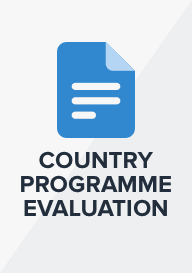
Mid-Term evaluation UNDP Eritrea Country Programme Document (CPD)
Output 1.1 The 2030 Agenda, Paris Agreement and other intergovernmentally-agreed frameworks integrated in national and local development plans, measures to accelerate progress put in place, and budgets and progress assessed using data-driven solutions
Output 1.3 Access to basic services and financial and non-financial assets and services improved to support productive capacities for sustainable livelihoods and jobs to achieve prosperity
Output 2.2 Civic space and access to justice expanded, racism and discrimination addressed, and rule of law, human rights and equity strengthened
Output 2.3 Responsive governance systems and local governance strengthened for socio economic opportunity, inclusive basic service delivery, community security, and peacebuilding
Output 3.1 Institutional systems to manage multi-dimensional risks and shocks strengthened at regional, national and sub-national levels
Output 4.1 Natural resources protected and managed to enhance sustainable productivity and livelihoods
Output 4.2 Public and private investment mechanisms mobilized for biodiversity, water, oceans, and?climate solutions
Output 5.1 Energy gap closed
Goal 1. End poverty in all its forms everywhere
Goal 5. Achieve gender equality and empower all women and girls
Goal 8. Promote sustained, inclusive and sustainable economic growth, full and productive employment and decent work for all
Goal 11. Make cities and human settlements inclusive, safe, resilient and sustainable
Goal 13. Take urgent action to combat climate change and its impacts
Goal 15. Protect, restore and promote sustainable use of terrestrial ecosystems, sustainably manage forests, combat desertification, and halt and reverse land degradation and halt biodiversity loss
Goal 16. Promote peaceful and inclusive societies for sustainable development, provide access to justice for all and build effective, accountable and inclusive institutions at all levels
Goal 17. Strengthen the means of implementation and revitalize the Global Partnership for Sustainable Development
1.1 By 2030, eradicate extreme poverty for all people everywhere, currently measured as people living on less than $1.25 a day
1.3 Implement nationally appropriate social protection systems and measures for all, including floors, and by 2030 achieve substantial coverage of the poor and the vulnerable
1.4 By 2030, ensure that all men and women, in particular the poor and the vulnerable, have equal rights to economic resources, as well as access to basic services, ownership and control over land and other forms of property, inheritance, natural resources, appropriate new technology and financial services, including microfinance
1.5 By 2030, build the resilience of the poor and those in vulnerable situations and reduce their exposure and vulnerability to climate-related extreme events and other economic, social and environmental shocks and disasters
5.1 End all forms of discrimination against all women and girls everywhere
5.2 Eliminate all forms of violence against all women and girls in the public and private spheres, including trafficking and sexual and other types of exploitation
5.5 Ensure women’s full and effective participation and equal opportunities for leadership at all levels of decision-making in political, economic and public life
8.3 Promote development-oriented policies that support productive activities, decent job creation, entrepreneurship, creativity and innovation, and encourage the formalization and growth of micro-, small- and medium-sized enterprises, including through access to financial services
11.5 By 2030, significantly reduce the number of deaths and the number of people affected and substantially decrease the direct economic losses relative to global gross domestic product caused by disasters, including water-related disasters, with a focus on protecting the poor and people in vulnerable situations
13.1 Strengthen resilience and adaptive capacity to climate-related hazards and natural disasters in all countries
13.2 Integrate climate change measures into national policies, strategies and planning
15.1 By 2020, ensure the conservation, restoration and sustainable use of terrestrial and inland freshwater ecosystems and their services, in particular forests, wetlands, mountains and drylands, in line with obligations under international agreements
15.2 By 2020, promote the implementation of sustainable management of all types of forests, halt deforestation, restore degraded forests and substantially increase afforestation and reforestation globally
16.3 Promote the rule of law at the national and international levels and ensure equal access to justice for all
16.6 Develop effective, accountable and transparent institutions at all levels
16.b Promote and enforce non-discriminatory laws and policies for sustainable development
17.18 By 2020, enhance capacity-building support to developing countries, including for least developed countries and small island developing States, to increase significantly the availability of high-quality, timely and reliable data disaggregated by income, gender, age, race, ethnicity, migratory status, disability, geographic location and other characteristics relevant in national contexts
1: Environment
2: Gender
3: Governance
4: Poverty
5: Resilience


